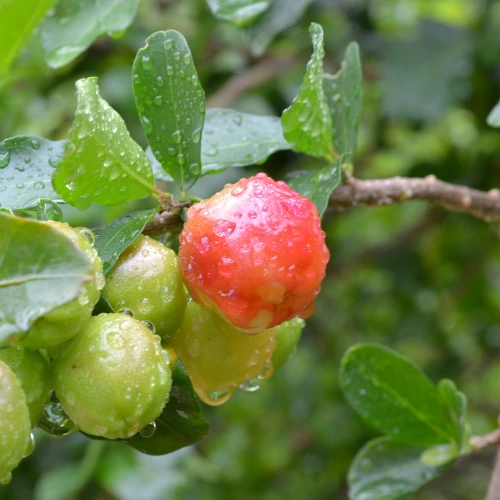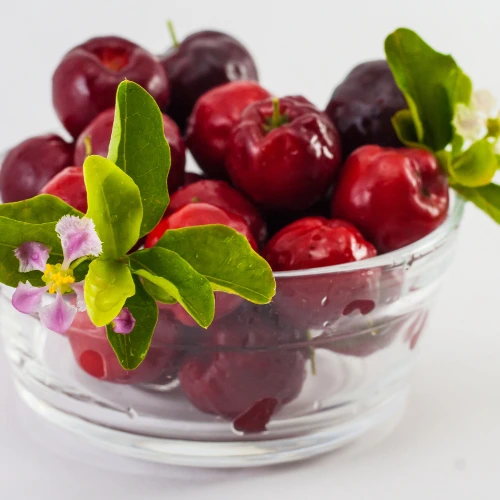Benefits of Acerola for Seniors
Are you looking for a natural way to boost your immune system and improve your overall health? Look no further than Acerola! This small, bright red fruit is packed with powerful antioxidants, vitamins, and minerals that can provide a range of health benefits, especially for seniors.
Let’s explore the benefits of acerola, from its ability to support healthy aging and promote immune function to its potential to protect against chronic diseases. Discover why acerola should be on every senior’s grocery list and how it can help you live your best life.
What is Acerola?
Acerola, also known as the Barbados cherry or West Indian cherry, is a small fruit that is native to South America, Central America, and the Caribbean. It has become increasingly popular in recent years due to its impressive nutritional profile and health benefits.
Acerola is particularly rich in vitamin C, with some varieties containing up to 80 times more vitamin C per serving than an orange. This makes it an excellent way to support immune function and protect against oxidative stress. Additionally, acerola is a good source of other important vitamins and minerals, including vitamin A, thiamine, riboflavin, and potassium.
One of the most unique aspects of acerola is its high concentration of phytochemicals, which are compounds that are naturally found in plants and have been shown to have a range of health-promoting effects. These include polyphenols, carotenoids, and flavonoids, which may help to protect against chronic diseases such as cancer, heart disease, and diabetes.
Acerola is also believed to have anti-inflammatory properties, which may help to reduce the risk of chronic inflammation and related conditions such as arthritis and inflammatory bowel disease.
Where it is commonly found and grown

Acerola is commonly found and grown in tropical regions around the world. This includes areas such as South America, Central America, and the Caribbean, as well as parts of Mexico and southern Texas.
In its natural habitat, acerola typically grows as a shrub or small tree and is known for its vibrant red fruit, which is approximately the size of a cherry. The fruit is typically harvested by hand and is available in both fresh and frozen forms. It is also commonly used to make juices, jams, and other food products.
While acerola is native to the Americas, it has been successfully cultivated in other parts of the world, including Southeast Asia, Africa, and Australia. This is due in part to its ability to adapt to different growing conditions, including varying levels of rainfall and soil quality.
Nutritional Value of Acerola
| Nutrient | Amount per 100g |
| Calories | 32 |
| Protein | 0.4g |
| Carbohydrates | 7.7g |
| Fiber | 1.1g |
| Fat | 0.3g |
| Vitamin C | 1644 mg |
| Vitamin A | 767IU |
| Thiamine (B1) | 0.09mg |
| Riboflavin (B2) | 0.06mg |
| Niacin (B3) | 0.4mg |
| Vitamin B6 | 0.06mg |
| Folate (B9) | 14μg |
| Calcium | 12mg |
| Iron | 0.2mg |
| Magnesium | 18mg |
| Phosphorus | 11mg |
| Potassium | 146 mg |
| Zinc | 0.1mg |
| Copper | 0.1mg |
Acerola’s high vitamin C content and how it benefits seniors
Acerola packs a powerful punch when it comes to its nutritional content. One of the most notable nutrients found in acerola is vitamin C, with some varieties containing up to 80 times more vitamin C per serving than an orange. This high vitamin C content can be particularly beneficial for seniors, as it plays a crucial role in supporting the immune system and overall health.
As we age, our immune system becomes less efficient, making us more susceptible to infections and illnesses. However, consuming foods rich in vitamin C, such as acerola, can help strengthen the immune system and reduce the risk of these health issues. Vitamin C also acts as an antioxidant, which means it helps protect the body against damage caused by free radicals.
In addition to its immune-boosting and antioxidant properties, vitamin C is also important for the production of collagen, a protein that is essential for healthy skin, bones, and joints. As we age, collagen production naturally decreases, but consuming foods like acerola that are high in vitamin C can help support healthy collagen production.
Health Benefits of Acerola for Seniors

Acerola is loaded with nutrients, including vitamin C, vitamin A, and antioxidants. These nutrients can be especially beneficial for seniors, as they can help support the immune system, promote healthy skin and eyesight, and protect against chronic diseases.
One of the most well-known benefits of acerola is its high vitamin C content. Acerola contains more vitamin C per serving than any other fruit, with some varieties containing up to 80 times more vitamin C than an orange.
This high vitamin C content can be particularly beneficial for seniors, as it plays a crucial role in supporting the immune system and reducing the risk of infections and illnesses.
In addition to its immune-boosting properties, acerola is also rich in antioxidants. Antioxidants help protect the body against damage caused by free radicals, which can lead to chronic diseases such as cancer and heart disease.
By consuming foods rich in antioxidants, such as acerola, seniors can help protect their bodies against these health issues.
Another benefit of acerola is its high vitamin A content. Vitamin A is important for maintaining healthy skin and eyesight, as well as supporting the immune system. As we age, our skin becomes less elastic and our eyesight can deteriorate, making it even more important for seniors to consume foods rich in vitamin A, like acerola.
Finally, acerola is also a good source of dietary fiber. Fiber is important for maintaining healthy digestion and reducing the risk of chronic diseases such as heart disease and diabetes. By consuming foods rich in fiber, such as acerola, seniors can help support their overall health and well-being.
How to Incorporate Acerola into Senior Persons’ Diet
Incorporating acerola into a senior person’s diet is easy and can be done in several ways. One of the simplest methods is to consume fruit as a snack. Acerola berries can be eaten fresh or dried and can be added to smoothies, salads, or yogurt bowls.
Additionally, acerola can be used to make a delicious juice that can be consumed daily to reap the benefits of its high vitamin C content.
Another way to incorporate acerola into a senior person’s diet is by taking supplements. Acerola supplements are available in various forms, such as capsules, tablets, and powders. These supplements are a convenient option for seniors who may not have access to fresh acerola or who prefer a more concentrated form of fruit.
It’s important to note that while acerola is an excellent source of vitamin C, it shouldn’t be the only source of this nutrient in a senior person’s diet. A well-rounded diet that includes a variety of fruits and vegetables can help ensure that seniors receive all the essential vitamins and minerals their bodies need.
Suggestions for adding acerola to meals and snacks
Smoothies
Acerola can be added to smoothies to give them a tangy and refreshing flavor. Mix acerola with your favorite fruits and vegetables, such as banana and spinach, for a nutritious and delicious smoothie.
Salads
Acerola can be used to add some zest to salads. Cut the fruit into small pieces and sprinkle them on top of your salad.
Yogurt
Add acerola to plain yogurt for a healthy and flavorful snack. You can also mix it with honey or granola for added crunch.
Salsas
Acerola can be used to make delicious salsa. Combine the fruit with tomatoes, onions, and cilantro for a refreshing dip.
Baked goods
Acerola can be added to baked goods such as muffins, cakes, and bread. Mix the fruit into the batter or use it as a topping.
Jams and preserves
Acerola can be used to make homemade jams and preserves. Combine the fruit with sugar and lemon juice for a sweet and tangy spread.
Potential Side Effects and Precautions
Acerola is generally considered safe for consumption, but like any supplement or food, it does carry potential side effects and precautions that seniors should be aware of. It is important to note that the benefits of acerola outweigh the potential risks, but seniors should still take the necessary precautions.
One of the main side effects of acerola is its high vitamin C content. While vitamin C is essential for good health, consuming too much can cause gastrointestinal issues such as diarrhea, nausea, and stomach cramps. Seniors with a history of kidney stones or kidney disease should also be cautious when consuming acerola, as the high levels of vitamin C can increase the risk of kidney stones.
Acerola may also interact with certain medications, including blood thinners and chemotherapy drugs. It is important for seniors taking these medications to consult with their healthcare provider before adding acerola to their diet.
In addition, seniors who are allergic to cherries or other fruits in the Rosaceae family may also be allergic to acerola. If you experience any signs of an allergic reaction, such as hives, difficulty breathing, or swelling of the face, lips, tongue, or throat, seek medical attention immediately.
Conclusion
Acerola is an excellent addition to a senior’s diet due to its numerous health benefits. Its high vitamin C content helps boost immunity and protect against various diseases and ailments, while also promoting healthy aging.
However, it is important to exercise caution and consult a healthcare professional before incorporating acerola into your daily routine, especially if you are on medication or have pre-existing medical conditions.
Overall, adding acerola to your diet can be a simple and effective way to support your health and well-being in your senior years.
Have you tried incorporating acerola into your diet? How has it benefited you? Let us know in the comments below.
